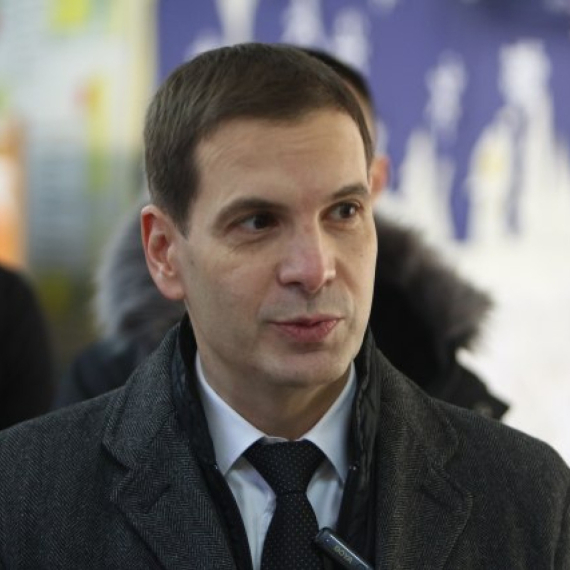U.S. expert: Autonomy gives Kosovo more than independence
A commentary published in the Wall Street Journal re-examines the value of the U.S. Kosovo policy.
Monday, 11.02.2008.
14:38

A commentary published in the Wall Street Journal re-examines the value of the U.S. Kosovo policy. In a piece entitled, "Let's avoid another Kosovo crisis", Ruth Wedgwood, a professor of international law and diplomacy at Johns Hopkins University, acknowledges that she is joining "strongly worded essays" recently published in the Washington Times by former U.S. Secretary of State Lawrence Eagleburger, former Assistant Defense Secretary Peter Rodman and former UN Ambassador John Bolton. U.S. expert: Autonomy gives Kosovo more than independence They all "expressed grave concern about the haste of the current Bush foreign policy team in encouraging Kosovo to declare unilateral independence. Their storm warning - that such a declaration could cause violence in the province and lead to a crisis with Russia -is worth heeding," Wedgwood writes. The professor lauds the results of the presidential election in Serbia last weekend, which saw incumbent Boris Tadic re-elected, but adds that "now it is the turn of the West to act with prudence and responsibility." Wedgwood describes Kosovo as "the southern province of Serbia that is home to Serb Orthodox Christians and ethnic Albanian Muslims," which has been "part of the territory of Serbia since before the First World War, and its ancient monasteries are iconic to the Serbs." "It is a dangerous precedent to tear apart the territory of a member state of the United Nations. And the timing could not be worse. No one needs a Kosovo crisis, while NATO remains short of troops in Afghanistan and maintains 16,000 troops in this autonomous province of Serbia. A Kosovo blowup would provide an easy excuse for gun-shy European allies to reduce their Afghanistan contingents," she argues. "Kosovo secessionists ignore economic realities. Kosovo has coal, lead and people, but it is stuck in a corner of Europe few tourists wander through. Some might visit its surviving Serbian Orthodox monasteries, but not while the place is in turmoil." "Since Europe has proclaimed without grace that the European economic union is limited to Christian countries, Kosovo's best (and perhaps only) chance to join Europe's economy is to ride in as a part of Serbia," Wedgwood's Wall Street Journal commentary continues. She sees an alternative to this in Kosovo joining the 57-member Organization of the Islamic Conference, "as Albania already has done". "This may bring financial assistance from the OIC, but the West should worry - with aid comes political influence," the professor notes. The article also warns of possible destabilizing effect Kosovo's unilaterally declared independence could have elsewhere in the region, particularly in Macedonia with its large ethnic Albanian minority, but also in Bosnia, and other countries with secessionist movements. Wedgwood acknowledges Slobodan Milosevic's heavy-handed approach to the simmering issue of Kosovo's separatism, that produced several war crimes indictments, including those against him and his closest allies, and adds: "But Milosevic is now dead, and Western policy should recognize the difference. Human rights activists in Serbia - who stood up to Milosevic when it was dangerous to do so - act with consistent principle in reporting the difficulties and dangers that will be imposed on Kosovo's substantial Serb minority." Wedgwood reminds of the March 2004 riots organized by ethnic Albanians in the province that resulted in the deaths of 19 people, "another thousand civilians injured, and widespread burning of Serb houses, churches and monasteries." "Independence will not cure this antipathy. It is hard to see how the NATO humanitarian intervention in 1999, designed to combat ethnic cleansing, is morally consistent with a new indifference to predictable counter-cleansing," she warns. Instead of implementing the Ahtisaari plan, rejected by the UN last spring, which would make Kosovo a kind of an international protectorate, the author advocates that the President George Bush and his Secretary of State "should consider a more practical option." "America and its allies, acting through the Security Council, can provide a permanent international guarantee of Kosovo's political autonomy within the formal territory of Serbia. Combined with the Ahtisaari conditions, even Belgrade and Moscow are likely to accept such a guarantee," Wedgwood argues. "This will give Kosovo as much, or more, than it would achieve through nominal independence. Autonomy can include the right to enter into certain types of international agreements. It can include the right to have international observer missions. Autonomy can entail more real power than is available to a neutered state, unable even to join the UN in the face of a Russian veto," she adds. "Even if Kosovo independence is ultimately unavoidable, there is much to be gained in securing the result in a way that Serbia and Russia can live with," Wedgwood concludes.
U.S. expert: Autonomy gives Kosovo more than independence
They all "expressed grave concern about the haste of the current Bush foreign policy team in encouraging Kosovo to declare unilateral independence. Their storm warning - that such a declaration could cause violence in the province and lead to a crisis with Russia -is worth heeding," Wedgwood writes.The professor lauds the results of the presidential election in Serbia last weekend, which saw incumbent Boris Tadić re-elected, but adds that "now it is the turn of the West to act with prudence and responsibility."
Wedgwood describes Kosovo as "the southern province of Serbia that is home to Serb Orthodox Christians and ethnic Albanian Muslims," which has been "part of the territory of Serbia since before the First World War, and its ancient monasteries are iconic to the Serbs."
"It is a dangerous precedent to tear apart the territory of a member state of the United Nations. And the timing could not be worse. No one needs a Kosovo crisis, while NATO remains short of troops in Afghanistan and maintains 16,000 troops in this autonomous province of Serbia. A Kosovo blowup would provide an easy excuse for gun-shy European allies to reduce their Afghanistan contingents," she argues.
"Kosovo secessionists ignore economic realities. Kosovo has coal, lead and people, but it is stuck in a corner of Europe few tourists wander through. Some might visit its surviving Serbian Orthodox monasteries, but not while the place is in turmoil."
"Since Europe has proclaimed without grace that the European economic union is limited to Christian countries, Kosovo's best (and perhaps only) chance to join Europe's economy is to ride in as a part of Serbia," Wedgwood's Wall Street Journal commentary continues.
She sees an alternative to this in Kosovo joining the 57-member Organization of the Islamic Conference, "as Albania already has done".
"This may bring financial assistance from the OIC, but the West should worry - with aid comes political influence," the professor notes.
The article also warns of possible destabilizing effect Kosovo's unilaterally declared independence could have elsewhere in the region, particularly in Macedonia with its large ethnic Albanian minority, but also in Bosnia, and other countries with secessionist movements.
Wedgwood acknowledges Slobodan Milošević's heavy-handed approach to the simmering issue of Kosovo's separatism, that produced several war crimes indictments, including those against him and his closest allies, and adds:
"But Milošević is now dead, and Western policy should recognize the difference. Human rights activists in Serbia - who stood up to Milošević when it was dangerous to do so - act with consistent principle in reporting the difficulties and dangers that will be imposed on Kosovo's substantial Serb minority."
Wedgwood reminds of the March 2004 riots organized by ethnic Albanians in the province that resulted in the deaths of 19 people, "another thousand civilians injured, and widespread burning of Serb houses, churches and monasteries."
"Independence will not cure this antipathy. It is hard to see how the NATO humanitarian intervention in 1999, designed to combat ethnic cleansing, is morally consistent with a new indifference to predictable counter-cleansing," she warns.
Instead of implementing the Ahtisaari plan, rejected by the UN last spring, which would make Kosovo a kind of an international protectorate, the author advocates that the President George Bush and his Secretary of State "should consider a more practical option."
"America and its allies, acting through the Security Council, can provide a permanent international guarantee of Kosovo's political autonomy within the formal territory of Serbia. Combined with the Ahtisaari conditions, even Belgrade and Moscow are likely to accept such a guarantee," Wedgwood argues.
"This will give Kosovo as much, or more, than it would achieve through nominal independence. Autonomy can include the right to enter into certain types of international agreements. It can include the right to have international observer missions. Autonomy can entail more real power than is available to a neutered state, unable even to join the UN in the face of a Russian veto," she adds.
"Even if Kosovo independence is ultimately unavoidable, there is much to be gained in securing the result in a way that Serbia and Russia can live with," Wedgwood concludes.


























































Komentari 26
Pogledaj komentare